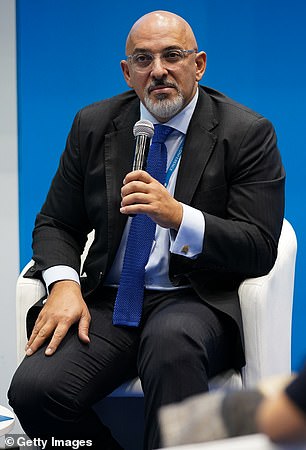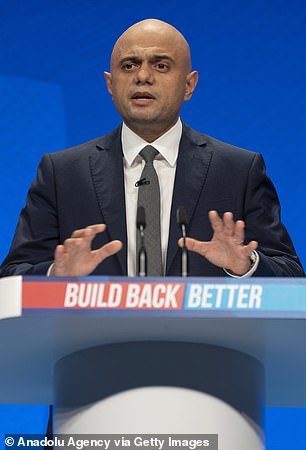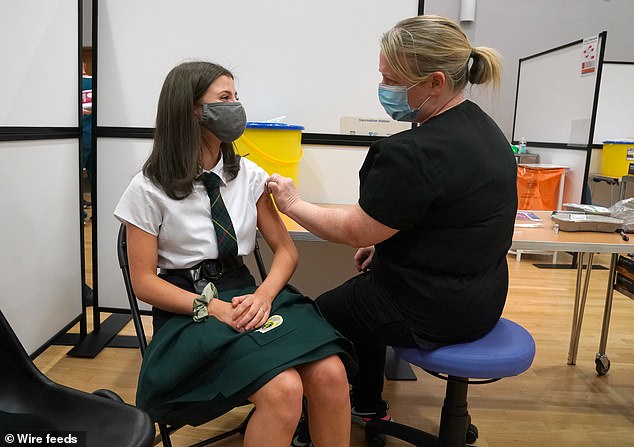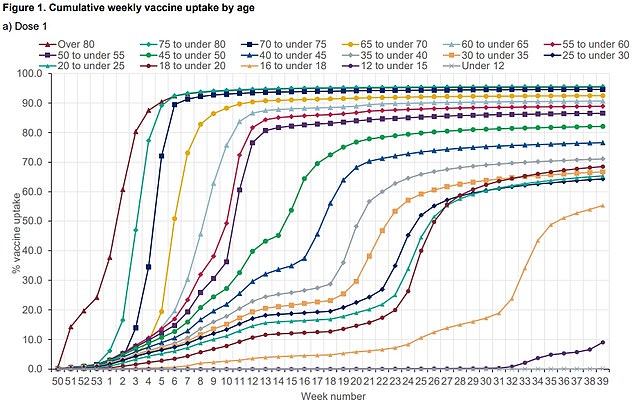Ministers have urged parents to get their children vaccinated against Covid amid concerns about the rollout of jabs in secondary schools.
The plea comes after one in 12 pupils in England aged 11 to 16 were thought to have been infected on October 2, according to estimates from the Office for National Statistics.
In a joint letter to parents of secondary school and college pupils, Nadhim Zahawi and Sajid Javid said ‘vaccines are our best defence’ against the virus.
The Education Secretary and Health Secretary said that young people should get vaccinated and test themselves regularly to reduce the spread of the virus and avoid missing school or college.
Meanwhile, a school leaders’ union said head teachers are ‘increasingly frustrated’ about delays to the vaccination programme for 12 to 15-year-olds in schools at a time of rising pupil absences.
More than 200,000 pupils — one in 40 — were off school at the end of last month for reasons connected to the coronavirus, according to official figures.
And just 10 per cent of students aged 12-15 had received their first jab by October 3, according to the UK Health Security Agency.
Three million pupils in the age groups are eligible to receive a single vaccine as part of a rollout that began three weeks ago.
The move to offer jabs to children was hugely controversial because of their tiny risk of falling seriously ill from the virus. Health officials insisted the move was necessary to avoid pupils missing time off school this winter.


In a joint letter to parents of secondary school and college pupils, Education Secretary Nadhim Zahawi (left) and Health Secretary Sajid Javid (right) said ‘vaccines are our best defence’ against the virus

High school pupil Molly Rowe gets her jab at Fernhill community centre in Rutherglen, South Lanarkshire

The UK Health Security Agency graph shows the vaccine uptake by age group. Only nine per cent of 12 to 15-year-olds have had the jab, despite the rollout beginning three weeks ago
In the letter on Monday, Mr Zahawi and Mr Javid asked for parents’ ‘support’ to encourage their children to test themselves for Covid twice a week and to ‘come forward’ for the jab to ensure face-to-face lessons can continue.
The ministers wrote that vaccines help protect young people, benefits those around them and reduces transmission.
The letters to parents states: ‘We know that some of you will be concerned about the health risks to the young people you care for.
‘We want to reassure you that the evidence shows that young people remain at very low risk of serious illness from Covid. However, we need to continue to reduce the spread of Covid.
‘Young people who get ill will need to miss school or college, and may spread it to others.
‘That is why we are encouraging you all to support your children to get vaccinated and to continue to test regularly.
‘This will help to detect cases early, reduce spread, and keep students in education.’
It adds: ‘Vaccines are our best defence against Covid. They help protect young people, and benefit those around them.
‘Vaccination makes people less likely to catch the virus and less likely to pass it on.’
The programme is expected to be delivered primarily within schools, but in Scotland young people in this cohort can also go to drop-in vaccine clinics.
More than a third of 12 to 15-year-olds in Scotland have received a jab, the latest figures suggest.
The Association of School and College Leaders (ASCL) has said it would support the use of walk-in centres in England if it would help to ‘boost take-up and speed of delivery’ of vaccines among the age group.
It comes after figures showed the number of children out of school for Covid related reasons in England increased by two-thirds in a fortnight.
The Department for Education estimates that 2.5 per cent of all pupils – more than 204,000 children – were not in class for reasons connected to coronavirus on September 30.
Geoff Barton, general secretary of ASCL, said: ‘We welcome the intervention of the Education Secretary in encouraging take-up of Covid vaccinations, and indeed anything else that can be done to boost this crucial programme.
‘However, school leaders are increasingly frustrated about delays to the rollout of coronavirus vaccinations.
‘There appear to be logistical issues around the capacity of health teams to deliver vaccinations at the speed and scale required.
‘The urgency of this programme is self-evident from the fact that the latest Government statistics show that more than 200,000 pupils were out of school at the latest count because of coronavirus-related reasons.
‘Many schools are also experiencing teacher shortages because staff are contracting the virus.’
Mr Barton has called on the Government to ‘do everything possible’ to ensure the vaccination programme is properly resourced in a bid to tackle disruption.
‘If walk-in centres would help to boost take-up and speed of delivery we would very much welcome that,’ he added.
Paul Whiteman, general secretary of school leaders’ union NAHT, said: ‘The vaccination programme is proceeding slowly in secondary schools.
‘It is important that parents and young people are offered the vaccine as quickly as possible so that they can make their decision about whether to take it.
‘Unfortunately, one of the reasons for the slow deployment is that children are missing their chance for vaccination because they have caught Covid.
‘If they are off sick they miss vaccination slots at school – and they cannot be jabbed while they are ill anyway – there is a 28-day waiting period before a child who has had Covid can then have the vaccine.’
He called for other measures to be pursued – such as improved ventilation – to reduce illness and disruption and ‘to speed up the vaccination rollout’.
A report from the ONS on Friday revealed the virus was most prevalent among children aged 11 to 16 last week, with 6.9 per cent of them estimated to have been infected at any point – around one in 15 youngsters.
But data for the most recent day alone shows 8.1 per cent had Covid – equating to one in 12 children in the age group.
Cases among youngsters have soared since they returned to classrooms from the beginning of last month.
Some local authorities – including in parts of the South West, Cumbria and Northamptonshire – have since brought back face masks in an attempt to quell the latest surge.
WHAT DID THE LETTER SAY?
We know that children and young people have been hugely affected by the pandemic, both in terms of their education and their ability to socialise and participate in activities that benefit them outside of formal education.
We want to thank you as parents and guardians of secondary school and college students for your support over the last eighteen months. We know this time has been difficult for many of you, as well as for the young people you care for.
As students return to the classroom, we would ask for your continued support to make sure your children are able to stay in face-to-face learning, by encouraging them to:
Test themselves for Covid twice a week, and more frequently if they are specifically asked to do so. This way, we can find individuals who have the virus but are not showing symptoms, and stop them from passing it on to othersCome forward for the Covid vaccine. This is one of the best things young people can do to protect themselves and those around them
We know that students have missed a lot of time in school and college since the pandemic started, and that there is no substitute for face-to-face learning. Keeping students in the classroom in the coming months is therefore a Government priority, both for their immediate and longer-term wellbeing.
We know that some of you will be concerned about the health risks to the young people you care for. We want to reassure you that the evidence shows that young people remain at very low risk of serious illness from Covid.
However, we need to continue to reduce the spread of Covid. Young people who get ill will need to miss school or college, and may spread it to others. That is why we are encouraging you all to support your children to get vaccinated and to continue to test regularly. This will help to detect cases early, reduce spread, and keep students in education.
Vaccines are our best defence against Covid. They help protect young people, and benefit those around them. Vaccination makes people less likely to catch the virus and less likely to pass it on.
The Covid vaccination programme for children aged 12-15 years has now started. Thousands of young people across the country have already taken the opportunity to receive their vaccine. If your child is 12-15 years old, a consent form and information leaflet from the NHS will be sent home allowing you to provide consent for your child to receive their vaccination at school
We remind you that 16 and 17-year-olds can book their vaccination through the National Booking Service or find a convenient walk-in site. Please do help your 16- and 17-year-olds to book a vaccination for yourself if you have not done so already, or if you have missed a second dose.
We ask that you support and encourage your children to test twice a week at home, every week, with Lateral Flow Device (LFD) tests. This will help us reduce the transmission of Covid among our children. Please report and upload test results online, even if they are negative or void, as this allows us to understand the virus and take additional action when needed.
In addition to regular twice weekly testing:
Children who receive a positive LFD result should isolate and book a PCR test to confirm their result.Children who are identified as a close contact by NHS Test and Trace should take a PCR test and continue to go to school while they wait for their result.In response to potential outbreaks, your school, college or local health team may advise additional testing. For example, if your child is identified as a close contact, they may be asked to take daily LFDs, while they wait for their PCR result. In this scenario, they should continue to attend school as long as their LFD results remain negative.
Additionally, please encourage your child to follow guidance on wearing face coverings in crowded spaces with people they don’t know well, for example on school transport.
We know that many of you will have questions or concerns about this, and we understand that. The NHS website (www.nhs.uk) is an excellent source of advice, which we hope will be able to answer many of your questions about testing or vaccination. If not, you can call the 119 service who should be able to help with questions on testing. When you get a vaccination consent form for your child, it will include details of how you can ask further questions of your local teams.
Thank you again for your support.
Advertisement
Source link : https://www.dailymail.co.uk/news/article-10080595/Parents-urged-children-Covid-19-jabs-amid-vaccine-rollout-concerns.html











